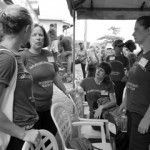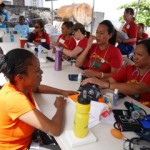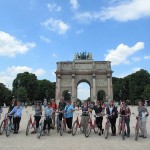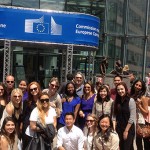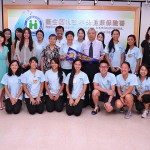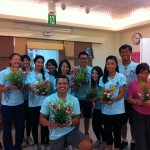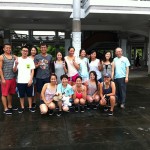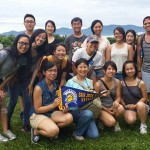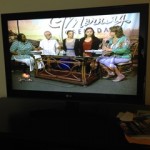During the summer, three departments and schools in the College of Applied Sciences and Arts launched international programs for what Interim Dean Alice Hines hopes will eventually encompass all the departments and schools within the college.
Students in Occupational Therapy, the Valley Foundation School of Nursing and the School of Journalism and Mass Communication participated in various Faculty-Led Study Abroad programs that took them to places such as Europe, Grenada, Vietnam and Taiwan.
Vietnam
While the ultimate goal is that all students who graduate with a degree from the College of Applied Sciences and Arts will participate in some sort of international experience, nine OT students participated in the summer pilot. For a course in Vietnam, students were expected to examine the relationship between the cultures and environment in Vietnam by looking at the ways humans adapt and impact their natural environments. During the trip, students visited temples, pagodas and cultural sites where they conducted a type of ethnographic research called “thick descriptions.”
Liz Cara, the acting chair for OT, said the students “have an awareness of other people and cultures and of themselves as global citizens and advocates for the well-being in international health.” While OT faculty visited universities to talk about Occupational Therapy, the students had a chance to present to faculty at Da Lat University. They also participated in “Tea Talks” at Sozo Café, in Saigon, which is a café that employees people with disabilities and sponsors students who do volunteer work with disadvantaged groups. The SJSU students met with groups to answer questions about the US and discuss experiences with cultural aspects and health systems in Vietnam. They also presented a slide show presentation on occupational therapy at the café.
Grenada

Debbie Nelson oversees screenings and health education at the Health Fair in Guave during the Grenada study abroad program.
A group of 23 students from Nursing and Occupational Therapy traveled to Grenada, West Indies for a global service-learning course. Nursing Faculty Tamara McKinnon, Deborah Nelson and then Occupational Therapy Chair Pamela Richardson traveled with students to the Caribbean island where students were able to achieve clinical course objectives through on-site activities as well as through the use of simulation prior to and following the global experience.
During their visit, students met with the Ministry of Health, Hospitals and clinics and also had an opportunity to visit clinical sites throughout the island. The students participated in a health fair in a rural part of the island, conducting home visits to train family members and local students, and conducted television and radio interviews. The students all kept a reflective journal during their trip with photos and narrative.
The core principles of the program included compassion, curiosity, courage, collaboration, creativity, capacity building and competence, according to McKinnon.
France, Spain and Belgium
Twenty-two SJSU students joined Dr. Matt Cabot, associate professor in SJSU’s School of Journalism and Mass Communications, on a four-week global leadership program in Europe. The students spent three weeks in Paris, and one week in Madrid, visiting some of Europe’s top strategic communication firms and experiencing a wide variety of cultural activities. Students also spent a day in Brussels, Belgium, where they attended two lectures at the European Commission. All the

SJSU students enrolled in the faculty-led program “Paris: City of Culture,” took a bike tour around Paris.
activities were designed to help students develop the kind of “global mindset” necessary to think, act, and lead globally.
Linda Levine, a professor in the department of Health Science and Recreation, along with David Buseck, of International and Exte
nd Studies, created an FLP called “Paris: City of Culture.” This summer 14 students were able to attend the program to learn about the history and diversity of France, with an emphasis on Paris. During their trip, which provided credit in two GE areas, students learned about various cultures that included different religious backgrounds, occupational backgrounds and other aspects of identity. During the trip students had the opportunity to visit the Chateau de Marseilles, Musee D’Orsay and to take a Thai/French cooking class, among other places.
Taiwan
After a successful pilot program last summer, Chia-Ling Mao, from the Valley Foundation School of Nursing, ran another Faculty Led Program to Taiwan this summer, with Megan Chang, of Occupational Therapy. This year’s group consisted of nursing and occupational therapy students. Having students from different departments participate in this year’s program gave the students an opportunity to foster interdisciplinary relationships and learn from each other. The main goal of this program was to increase students’ cultural competency, promote and facilitate cultural exchange, and expand students’ worldview. The adventure in Taiwan exposed student to the three levels of healthcare. Seeing Taiwan’s National Health Insurance program in action was an eye-opening experience for the students. During the trip, the students were tasked to design a health promotion activity for the elderly. The students were able to incorporate occupational therapy and nursing activities together to design a range of motion exercise suitable for the geriatric population. By the end of the program, the students all expressed aspects of their experiences in which they could implement into their future practices as health-care providers.
Advice for students and faculty
“We learn to be curious and educate ourselves, rather than to be judgmental and walk away,” said Levine, in an email. “Students actively engaged in learning about the histories and governments and currencies, business, educational and health care systems” that share similarities and differences with American systems.
Levine said, though she grew up with many travel experiences with parents who were international tour directors, it wasn’t until she traveled on her own as a college student “that the light bulb of personal transformation was illuminated.”
“The students of today are so much more connected to the resources of the world than even we were a generation ago, but there is nothing like leaving the comforts of home to experience a new culture first hand,” she said.
For the OT students, the goals of the course included demonstrating knowledge of global social issues and prevailing health and welfare needs of populations with or at risk for disabilities and chronic health conditions; analysis of the current policy issues and the social, economic, political, cultural, geographic and demographic factors that influence the practice of occupational therapy outside of the United States; to evaluate and address the various contexts of health care, education, community, political and social systems as they relate to the practice of occupational therapy outside of the United States; Articulate how occupational therapists collaborate with Interprofessional teams, clients, families, and communities in the design and implementation of sustainable and culturally relevant services; and reflect on the impact of the international experience on their professional development and identity as an occupational therapist and as a global citizen.
Cara said she recommended departments interested in developing new FLPs start early.
“The first experience is primarily exploratory and will hopefully lead to fuller experiences with more hands-on practical experiences,” she said via email. “The orientations prior to traveling are tremendously valuable so make sure they are well-planned.”
Levine said the time and work put in for the first one to two years “pays off in spades after that,” though she added that it does take patience to complete the Faculty-Led Program paperwork required to create a new international program.
“My advice would be to stay on top of all the SJSU requirements and demands,” she said.
Cara also recommended preparing students for traveling by letting them know it can be unpredictable.
“It is unpredictable and accommodations are not always what you envision so be flexible,” she said. “If you are flexible, you will be rewarded with memories and self-awareness that will last for a life time.”
Cara said for her students the opportunity to spend time overseas has allowed to think with more of a “worldcentric” lens and to think about how they will be global citizens.
- Occupational Therapy students and Dr Pam Richardson, second from the left, had lots of visitors at the Guave Health Fair.
- Debbie Nelson oversees screenings and health education at the Health Fair in Guave during the Grenada study abroad program.
- SJSU students enrolled in the faculty-led program “Paris: City of Culture,” took a bike tour around Paris.
- Dr. Matt Cabot traveled to Paris, Madrid and Brussels with 22 San Jose State University students, many of whom are students in the School of Journalsim and Mass Communication. Here the stduetns pose in front of the European Commission.
- Students visited with healthcare agencies while in Taiwan.
- San Jose State Students present flowers during one of their stops on their trip to Taiwan. The students created a health-promotion activity for senior citizens.
- Nursing and Occupational Therapy students pose fora photo in Taiwan with Professor Chia-Ling Mao, front row, second from the left.
- Students showed their SJSU spirit with a banner as they traveled through Taiwan.
- Dr. Tamara McKinnon, far right, and students Mina Paz Arzadon and Claudine Luzano appeared on “Good Morning Grenada,” one of 5 media appearances by the group during their program.

